Key takeaways:
- Mediation facilitates open communication and helps parties express their underlying interests, fostering meaningful dialogue and creative solutions.
- Key skills for successful mediation include active listening, neutrality, and adaptability, which are crucial for navigating emotional and complex discussions.
- Choosing the right mediator based on their expertise, style, and reputation can significantly influence the mediation’s outcome and effectiveness.
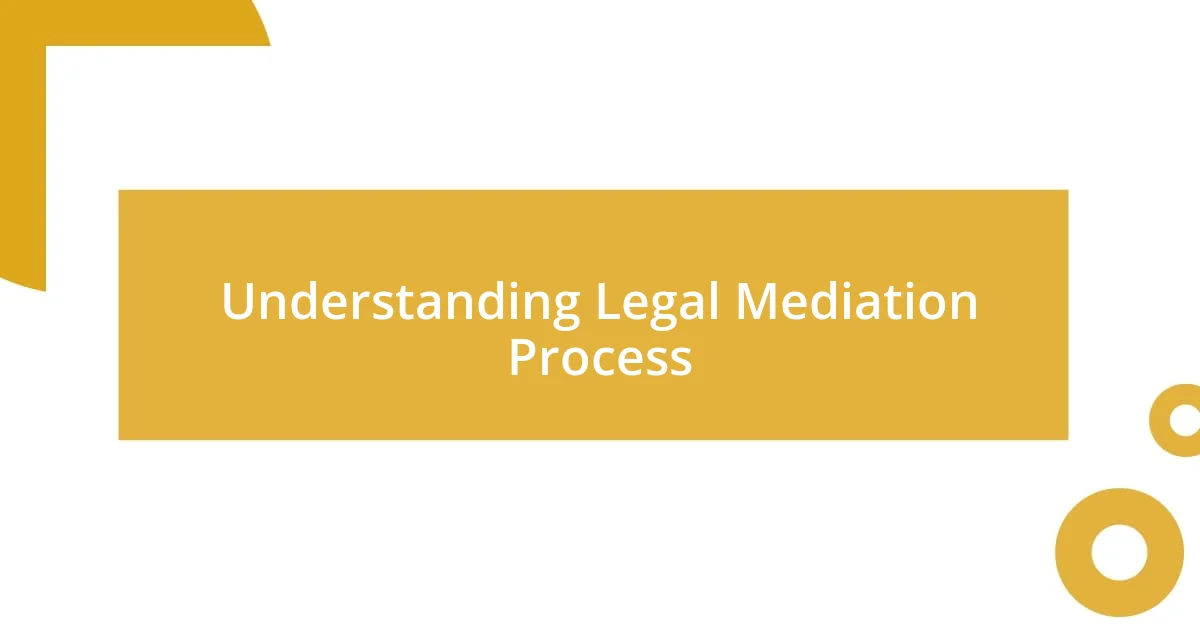
Understanding Legal Mediation Process
In my experience with legal mediation, I’ve found the process to be both structured and fluid, allowing for an open dialogue between parties. The mediator, acting as a neutral third party, facilitates discussions and helps identify each party’s underlying interests, which is crucial for reaching a compromise. Have you ever felt stuck in a conflict, unsure about how to express your real needs? That’s where a skilled mediator shines—they create a safe space for meaningful conversations.
What struck me during one session was the shift in atmosphere as the mediator encouraged honesty and transparency. Initially, the participants were guarded, but as the conversation flowed, I could see walls crumbling. It reminded me of how vital honest communication is in resolving disputes—sometimes, all it takes is a little encouragement to share what truly matters.
The process usually involves several stages: initial meetings, joint sessions, and private caucus discussions. Each step serves to gradually build understanding and trust. This hierarchy of communication fosters an environment where creative solutions can manifest. Reflecting on my own mediation experiences, I realized how empowering it is to be part of a process designed not just for resolution, but for meaningful engagement.
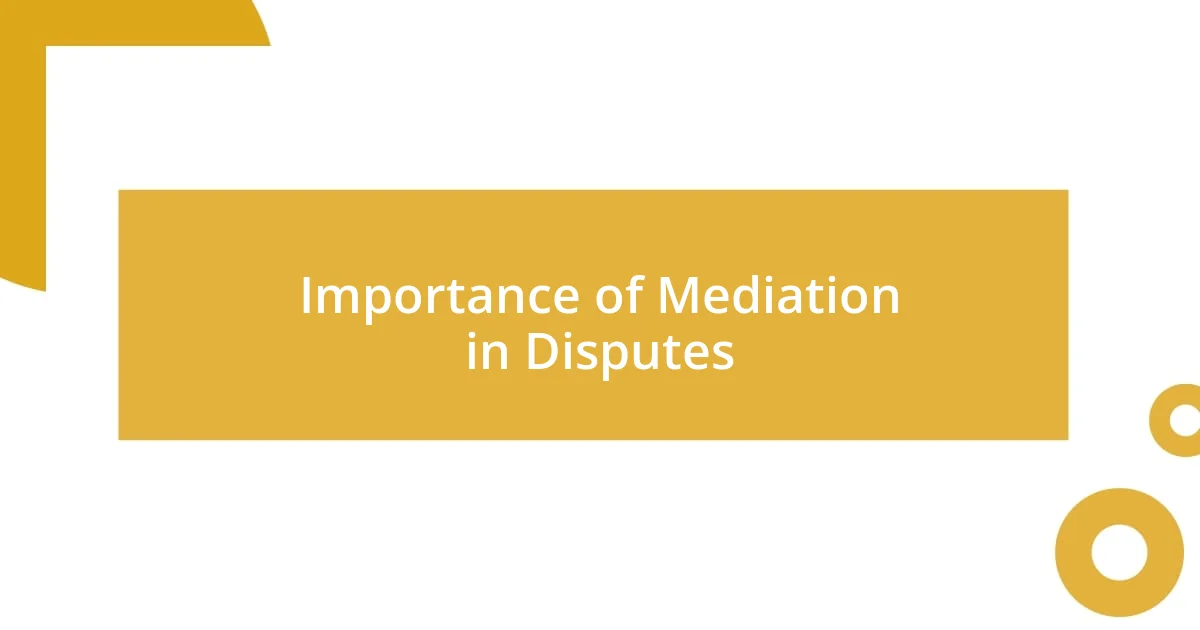
Importance of Mediation in Disputes
Mediation holds significant importance in dispute resolution, acting as a bridge where parties can reconnect despite their differences. What I’ve noticed is that mediation often brings out genuine emotions that may have been suppressed during conflicts. For me, witnessing a heartfelt moment when one party voiced their vulnerability was eye-opening—it underscored that people are not just arguing over issues; they have feelings and personal stories that matter deeply.
Here are some key reasons why mediation is crucial in disputes:
- Facilitates Open Communication: Mediation encourages transparent dialogue, allowing each party to express their needs without fear of judgment.
- Promotes Interest-Based Solutions: Instead of focusing solely on positions, mediation helps uncover the interests driving those positions, leading to creative, mutually beneficial outcomes.
- Saves Time and Resources: Compared to litigation, mediation is typically faster and less costly, helping parties resolve disputes efficiently.
- Preserves Relationships: By fostering a cooperative environment, mediation can help maintain or even strengthen relationships after a dispute, which is especially important in family or business contexts.
- Empowers Participants: In mediation, parties have control over the outcome, making the process feel more personal and respectful to their needs.
I remember a time when two long-time colleagues were in a heated disagreement. During mediation, I witnessed how addressing their underlying concerns shifted their perspectives dramatically. They left the session not only with a resolution but also a renewed appreciation for each other, which was inspiring. It reinforced my belief that the art of mediation is not just about finding a quick fix; it’s about nurturing understanding and healing, which can truly make a difference.
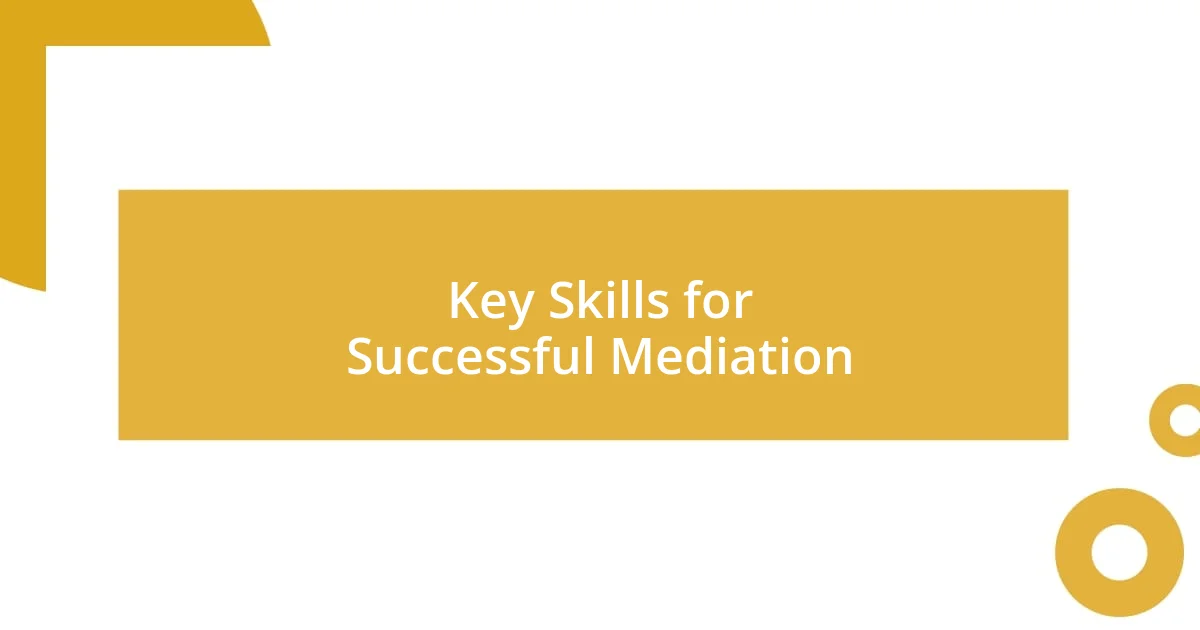
Key Skills for Successful Mediation
Being skilled in mediation requires a combination of interpersonal abilities and a deep understanding of the mediation process itself. One of the key skills I’ve witnessed is active listening. It goes beyond just hearing words; it’s about understanding emotions and intentions. In one particular mediation, I saw how a mediator’s genuine focus on a participant’s feelings led to a breakthrough. The party felt heard and, as a result, became more open to exploring solutions. Isn’t it amazing how feeling understood can change the entire dynamic of a situation?
Another crucial skill is the ability to remain neutral and foster a collaborative atmosphere. I’ve been part of sessions where tensions escalated, and the mediator had to quickly diffuse the conflict. The way they expertly redirected conversations while ensuring all voices were heard made a significant difference. It emphasized the importance of creating a safe environment where parties can discuss their concerns without fear of backlash. How often do we really consider the impact of a calm presence during heated moments?
Finally, adaptability stands out as a vital skill. Every mediation is unique, and being able to adjust strategies on the fly is essential. I remember a session where the initial plan didn’t resonate with the parties involved. The mediator quickly adapted, switching tactics to meet the participants’ needs, which ultimately led to a successful outcome. That experience taught me that flexibility can be a mediator’s greatest ally, allowing them to navigate different personalities and situations effectively.
| Key Skills | Description |
|---|---|
| Active Listening | Understanding emotions and intentions beyond just words. |
| Neutrality | Maintaining an unbiased stance to encourage collaboration and openness. |
| Adaptability | Flexibly adjusting strategies to meet unique needs of each mediation. |
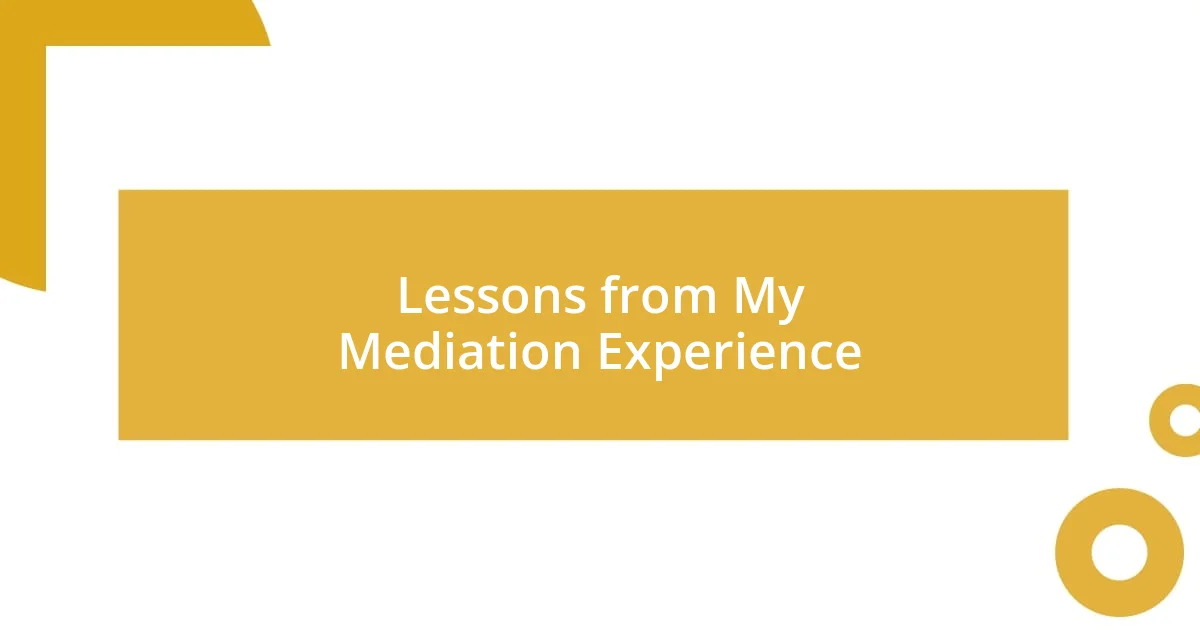
Lessons from My Mediation Experience
One of the most profound lessons I gleaned from my mediation experience revolves around the power of vulnerability. I recall a moment when an individual finally shared a personal story tied to their conflict, and it was like breaking down a wall. I can’t help but wonder how often we hold back our true feelings, thinking they won’t matter. Yet, in that moment, it was that very authenticity that shifted the atmosphere, paving the way for understanding and resolution.
I also learned the significance of patience during mediation. I remember a particular session where one party was clearly upset and resistant to the process. Instead of pushing too hard, the mediator gracefully allowed time for them to express their feelings. This made me realize that sometimes, giving space is the best way to encourage communication. Have you ever noticed how rushing someone only tends to lead to more frustration? It’s a lesson I carry with me, not just in mediation but in everyday interactions as well.
Lastly, the importance of framing discussions became shockingly clear to me. In one situation, the mediator reframed a negative comment into a constructive question, which flipped the dialogue around entirely. I was struck by how a simple shift in language can unlock a different perspective. Isn’t it fascinating how the words we choose can either build bridges or burn them? From that experience, I’ve come to appreciate the art of carefully crafting dialogue so it nurtures connection instead of conflict.
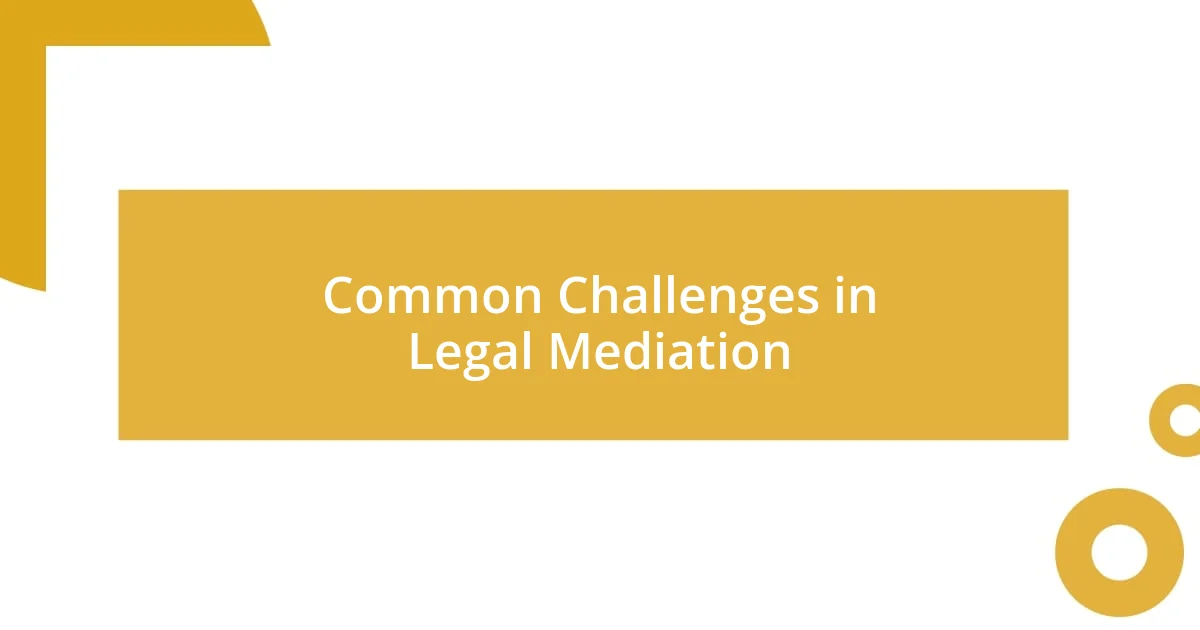
Common Challenges in Legal Mediation
Engaging in legal mediation can often reveal a series of challenges that can complicate the process. One common hurdle I observed was the emotional intensity present in disputes. In one mediation session, the parties were so charged with frustration that it hindered their ability to communicate effectively. I remember thinking, how can we get past this emotional barrier? It took skilled mediation to help them channel that energy into a productive discussion instead of letting it derail the session.
Another challenge is maintaining focus on the issues at hand. During a particularly drawn-out session, the discussions veered off course, leading to misunderstandings and frustrations. This made me realize how easily discussions can become tangled in personal grievances rather than the core issues. It was a stark reminder of why a mediator’s role includes not only facilitating but also guiding the conversation. How often do we lose sight of what truly matters in our conversations?
Sometimes, the unpredictability of participants’ reactions can throw a mediation off balance. In one instance, a participant unexpectedly became defensive when a suggestion was made. I felt the tension in the room shift instantly. It made me ponder how crucial it is for mediators to be prepared for the unexpected. By staying calm and using techniques to regroup the participants, the mediator steered the conversation back on track, demonstrating resilience and the ability to adapt. Isn’t it remarkable how composure can transform a potentially explosive moment into an opportunity for resolution?
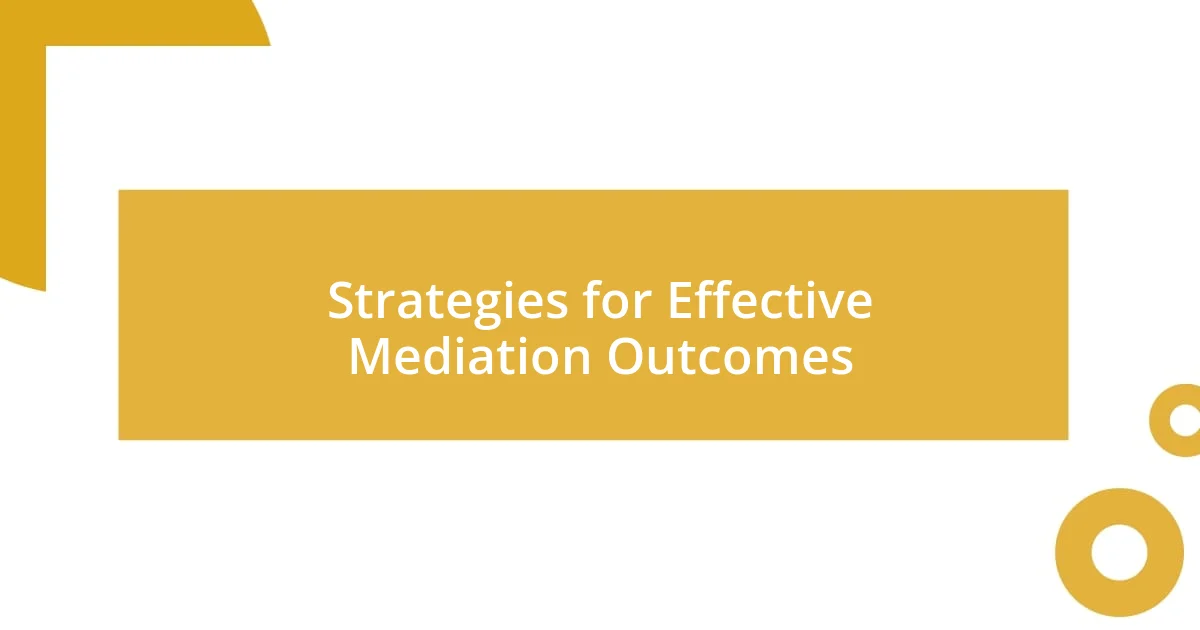
Strategies for Effective Mediation Outcomes
One strategy that stood out to me during mediation sessions was the importance of setting clear ground rules. I vividly recall a session where the participants agreed on basic guidelines for respectful communication right at the start. It felt like pressing the reset button; suddenly, there was a sense of safety that encouraged open sharing. Have you ever noticed how having a framework can transform the way people interact? Establishing these parameters not only fosters respect but also creates a collaborative environment essential for productive outcomes.
A technique I often found effective was the use of active listening. I still remember when a participant began recounting their experience; the genuine nods and affirmations from the mediator made a difference. It wasn’t just about hearing words; it was about acknowledging feelings. This strategy reminded me that when people feel heard, they’re more likely to engage constructively. How much more effective could our discussions be if we took the time to truly listen, instead of merely waiting for our turn to speak?
Additionally, I learned that summarizing points of agreement throughout the sessions can significantly enhance mediation outcomes. I experienced this firsthand during a particularly complex negotiation where the mediator periodically highlighted what the parties had already concurred on. It was enlightening to witness how this process transformed the mood, turning frustrations into a sense of progress. Isn’t it empowering to realize that even small victories can pave the way for larger resolutions? Acknowledging common ground is a simple yet powerful reminder of what can be accomplished when we focus on collaboration rather than opposition.
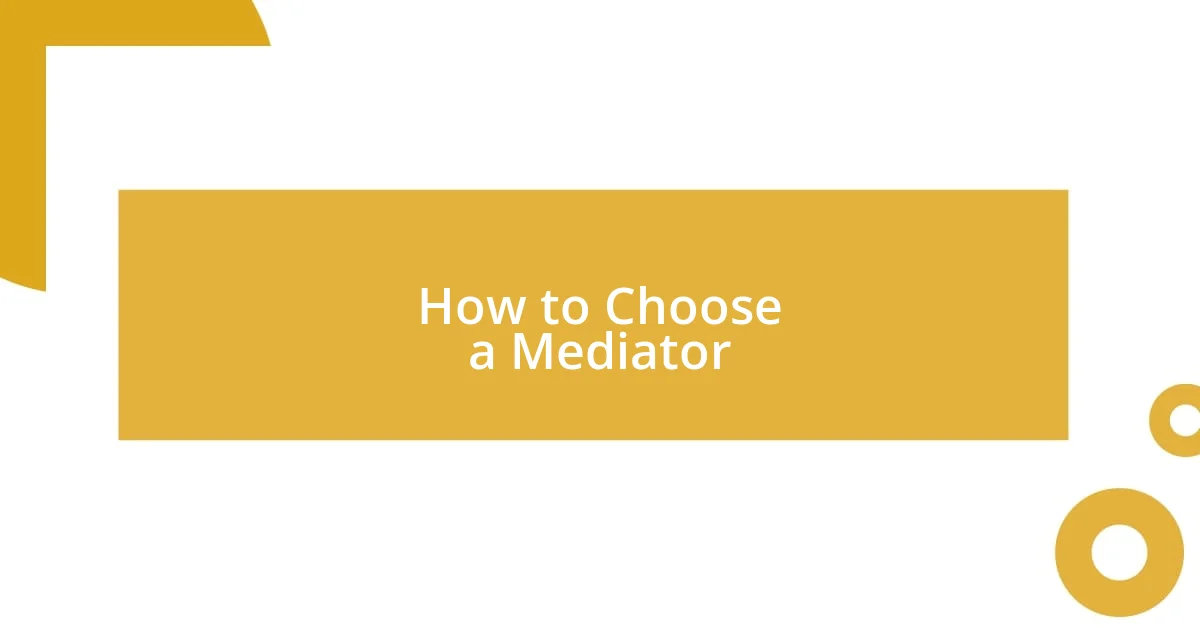
How to Choose a Mediator
Choosing the right mediator can significantly influence the outcome of your mediation process. In my experience, I discovered that it’s crucial to look for a mediator who specializes in the specific area of your dispute. For instance, during a complex contract dispute I was involved in, we chose a mediator with extensive background in business law, which helped streamline discussions and instilled confidence in both parties. Isn’t it reassuring to know that the person guiding you has in-depth knowledge of your particular situation?
Another important factor is the mediator’s style and approach. I remember attending a mediation where the mediator employed a highly collaborative method, encouraging open dialogues while also allowing for moments of private reflection. This balance kept the atmosphere calm and constructive. Reflecting on that experience, I realized it’s essential to select someone whose style aligns with the dynamics of your negotiation. Do you prefer a more facilitative mediator who encourages discussion, or one who takes a directive approach to offer solutions?
Lastly, consider the mediator’s credentials and reputation. I once found myself in a situation where word-of-mouth recommendations led us to a highly regarded mediator who had an extensive track record of successful resolutions. Those endorsements were invaluable, as they provided insight into the mediator’s effectiveness. It made me wonder—how often do we overlook the power of personal recommendations when choosing a professional? Taking the time to research and engage with potential mediators can make a world of difference in ensuring a more productive mediation experience.














